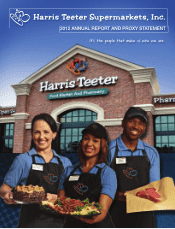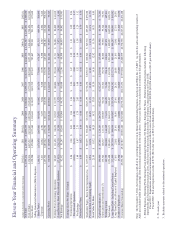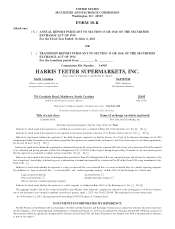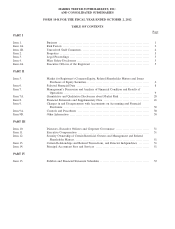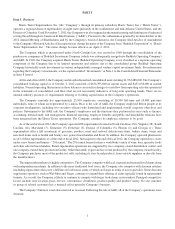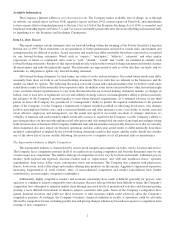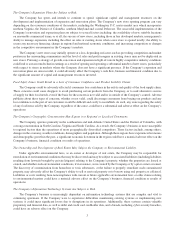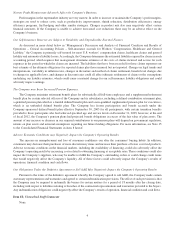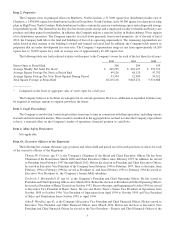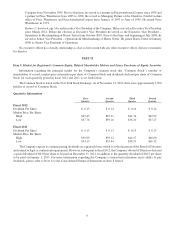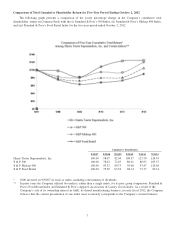Harris Teeter 2012 Annual Report Download - page 5
Download and view the complete annual report
Please find page 5 of the 2012 Harris Teeter annual report below. You can navigate through the pages in the report by either clicking on the pages listed below, or by using the keyword search tool below to find specific information within the annual report.PART I
Item 1. Business
Harris Teeter Supermarkets, Inc. (the “Company”), through its primary subsidiary Harris Teeter, Inc. (“Harris Teeter”),
operates a regional chain of supermarkets in eight states primarily in the southeastern and mid-Atlantic United States, and the
District of Columbia. Until November 7, 2011, the Company was also engaged in the manufacturing and distribution of industrial
sewing thread through its American & Efird business (“A&E”). Pursuant to the authorization granted by its shareholders at the
2012 Annual Meeting of Shareholders and by the Company’s board of directors, the Company filed Articles of Amendment
to the Company’s Restated Articles of Incorporation to change the name of the Company from “Ruddick Corporation” to “Harris
Teeter Supermarkets, Inc.” The name change became effective on April 2, 2012.
The Company, which is incorporated under North Carolina law, was created in 1968 through the consolidation of the
predecessor companies of Ruddick Investment Company (which was subsequently merged into Ruddick Operating Company)
and A&E. In 1969, the Company acquired Harris Teeter. Ruddick Operating Company is not classified as a separate operating
component of the Company due to its limited operations and relative size to the consolidated group. Ruddick Operating
Company historically made investments in various independently managed venture capital investment funds. For information
regarding the Company’s investments, see the caption entitled “Investments” in Note 1 to the Consolidated Financial Statements
in Item 8 hereof.
At the end of fiscal 2012, the Company and its subsidiaries had consolidated assets totaling $1,952,488,000. The Company’s
consolidated working capital as of October 2, 2012 consisted of $634,393,000 in current assets and $451,638,000 in current
liabilities. Normal operating fluctuations in these balances can result in changes to cash flow from operating activities presented
in the statements of consolidated cash flows that are not necessarily indicative of long-term operating trends. There are no
unusual industry practices or requirements relating to working capital items in the Company’s operations.
The Company currently has approximately 25,300 employees, consisting of 10,500 full-time and 14,800 part-time
individuals, none of whom are represented by a union. Prior to the sale of A&E, the Company employed fifteen people at its
corporate headquarters, including two executive officers who formulated and implemented overall corporate objectives and
policies. Subsequent to the A&E sale, the Company’s employees and the functions they performed in areas such as finance,
accounting, internal audit, risk management, financial reporting, employee benefits and public and shareholder relations have
been integrated into the Harris Teeter operations. The Company considers its employee relations to be good.
As of the end of fiscal 2012, the Company operated 208 supermarkets located in North Carolina (136), Virginia (38), South
Carolina (14), Maryland (7), Tennessee (5), Delaware (3), District of Columbia (3), Florida (1) and Georgia (1). These
supermarkets offer a full assortment of groceries, produce, meat and seafood, delicatessen items, bakery items, wines and
non-food items such as health and beauty care, general merchandise and floral. In addition, the Company operated pharmacies
in 143 of their supermarkets as of the end of fiscal 2012. Subsequent to the end of fiscal 2012, the Company opened two stores
under a new format and banner – “201central.” The 201central format features a worldwide variety of wine, beer, specialty foods
and other selected merchandise. Retail supermarket operations are supported by two company-owned distribution centers and
one company-owned dairy production facility. Other than milk, yogurt and ice cream produced by the company-owned facility,
the Company purchases most of the products it sells, including its store brand products, from outside suppliers or directly from
the manufacturers.
The supermarket industry is highly competitive. The Company competes with local, regional and national food chains along
with independent merchants. In addition to the more traditional food stores, the Company also competes with discount retailers
(including supercenters that carry a full line of food items), many of which are larger in terms of assets and sales. Some discount
supercenter operators, such as Wal-Mart and Target, continue to expand their offering of items typically found in supermarket
formats. As a result, the Company is likely to continue to compete with larger food chains in its markets. Principal competitive
factors include store location, price, service, convenience, cleanliness, product quality and product variety. No one customer
or group of related customers has a material effect upon the Company’s business.
The Company’s business is not characterized as seasonal. Following the sale of A&E, all of the Company’s operations were
domestic.
1

